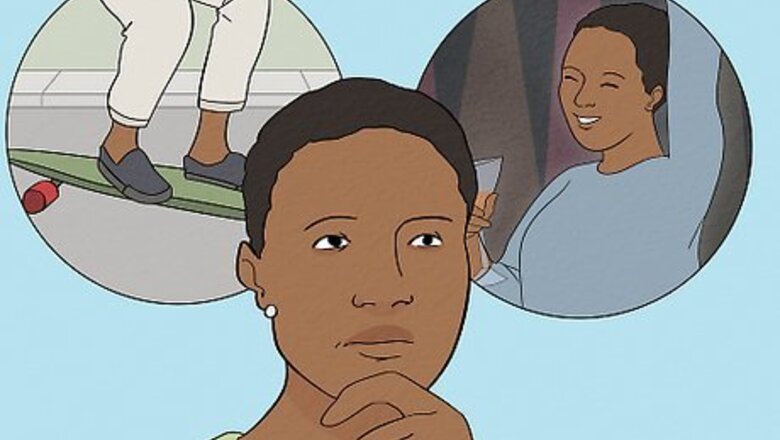
views
- Accept your age by embracing your past but not living in it. Instead of clinging to your "younger" years, look to the future and everything it has to offer.
- Know that aging is a sign that you've survived even your hardest battles—you're a warrior!
- Try and learn new things to reinvigorate your curiosity and appreciation for life.
Getting in the Right Mindset
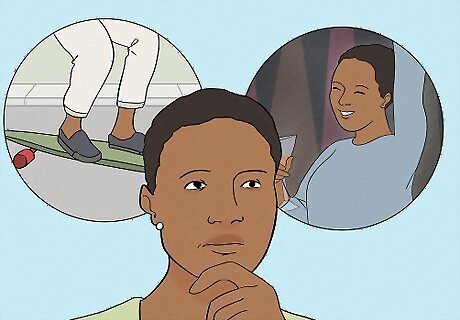
Have realistic expectations. Our culture encourages people to think they can be young forever if they just use the right creams and take the right supplements. The fact is, this just isn't true. As you enter your later years, try to develop realistic (not pessimistic) expectations of what getting older will actually be like. Don't expect the worst--having a negative view of the future can be a self-fulfilling prophecy. Likewise though, don't expect to be able to do everything you did in your 20s. If you have realistic expectations about what you will and will not be able to do, the transition to this period of life will be easier. Even the most youthful 90 year old, for example, usually won't be found skateboarding or deep sea diving. In fact, most people who live to this age will need help with tasks like getting groceries from the store. This doesn't mean, however, that you won't be able to take a stroll in the park with friends or play your favorite instrument.

Try to relax. Many people panic when they realize they are getting older. The result is a "fight or flight" response that causes people to frantically look for a solution, rushing out to buy the latest miracle cure. Try to stay calm and take things in stride. Being calm allows for more sober reflection on the situation. Thinking clearly allows us to come to terms with reality sooner. This, in turn, makes it possible to start accepting the changes that aging brings and finding happiness in this new stage of life.
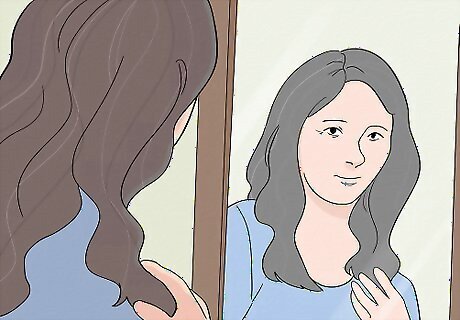
Avoid denial. There's nothing wrong with doing what you can to look and feel your best in later years. However, accepting you are getting older means you shouldn't try to mask or hide your age from others (or yourself). If putting on a mask of honey and yogurt makes your skin feel better or smoother or slows wrinkling, great. Healthy activities that help you look your best are fine. Don't try to do things to "cover up" your age though. It might be time, for example, to ditch the super-tight cut offs or toupee. Clinging to illusions of physical youth keeps us dependent on the validation of others, rather than helping us accept ourselves for who we now are. Think carefully before getting plastic surgery. The jury is out on the extent to which it actually makes people feel more attractive. What is clear is that sometimes when you get work done in one area, it only serves highlight wrinkles in another. This can start you down a path of one procedure after another, after another. Before you get one of these procedures, think about whether this might be the start of a road you don't really want to go down. It is often better to accept yourself for who you are.
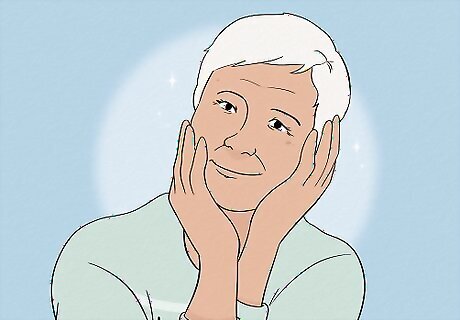
Redefine attractiveness. To extent you are able, try to rethink what attractiveness means, focusing on the whole person rather than a youthful physique. You are never going to look like a 20 year old again, but being attractive in your 40s, 50s, and 60s means something different than it did when you were in your 20s. Being self-assured and healthy is a different, more mature kind of beauty that you can aspire to. It will give you a sense of self-worth and attractiveness that trying (unsuccessfully) to look like your former self will not achieve. This may mean you have to argue with your inner voice. Because of the culture we live in, there's probably going to be a voice in your head saying "I look so old" or "I'm getting fat." Speak up against that inner voice, and counter it with positive statements like "I am healthy and loved."

Embrace your past, but don't try to relive it. Your past is a huge part of who you are. Reflecting on where you've been can help you become a more mature person, and reflecting on the changes you've gone through before can help you accept the changes you are experiencing now. Trying to relive the past as a way to cling to your youth, however, only delays acceptance of who you are now. A certain amount of nostalgia is inevitable and normal, but resist the temptation to try to recreate the past. For example, if you want to play football again to recapture some of the joy you experienced when you were younger, then keep in mind that you may not be able to play as hard or as long as you used to. You will probably need to start slow and build up your strength and endurance. You may also want to check with your doctor first to ensure that you are healthy enough to play.
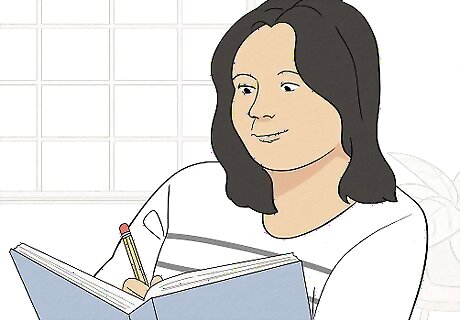
Be proud and grateful. The fact that you are getting older means you survived. Not everyone does. Further, the life experiences you have had have taught you lessons and, hopefully, granted you a wisdom younger people don't have. Be proud of what you have achieved and grateful for your life experience. Your perspective can be an advantage. You may know things about life that many people do not. Reflect on your life and see what lessons you can find there. Think about how you can make this wisdom valuable to others. Try keeping a gratitude journal to help you keep track of all of the things you feel grateful for. Keeping a gratitude journal or even just telling a loved one about a few things you feel grateful for each day can increase your happiness and well-being. For example, you might note that you feel grateful for your friends, a beautiful sunset, or even just a good cup of coffee. Keep adding items to your list every day and check it from time to time to remind yourself about what makes you feel grateful.
Staying Active

Keep learning. Continuing to have an active, fulfilling life will make acceptance of your aging easier. Even if you've reached a point where you are physically unable to do a lot of things you might like to do, you can keep learning new things. Read books and watch documentaries. Keep learning things and explore multiple perspectives on the world you live in. Seeing and finding out about new things will keep life interesting and help give you a sense that you haven't seen it all yet. Research has shown that people who keep learning throughout life are happier and retain their mental capacities better than those who do not. Keep your mind sharp and stay curious. Life will be better, and you'll keep feeling a sense of potential as you age.
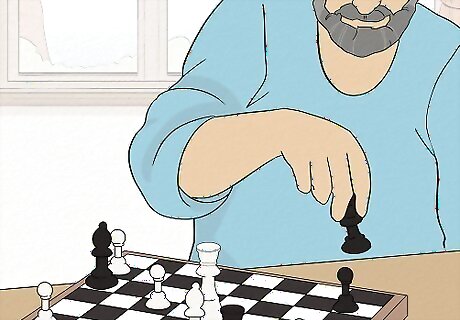
Try new things. Similarly, keep developing new skills. Take up a new hobby. Learn to play an instrument or take a music class. Take up chess. Learn to cook. Doing new things makes life feel more promising and keeps your mind sharp. Challenge yourself mentally. Even doing crosswords or other brain-teaser puzzles can help you maintain your mental facilities and stave off dementia. Knowing that your mind is still sharp and that you can still do new things in life will help you accept the fact that you are aging. Look for weekend classes for hobbies you want to explore.
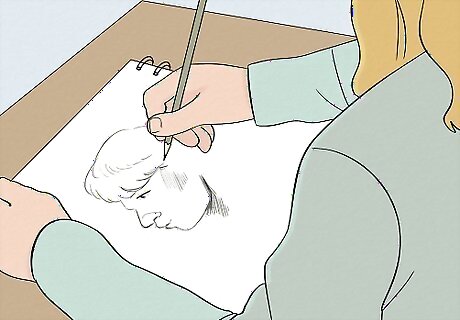
Keep doing what you're good at. Aging isn't all about decline. Experience can mean you've honed certain skills to a level that younger people have not. In addition to trying new things, keep doing things you excel at. You may be an expert in a certain field of knowledge, or maybe you've developed an artistic talent or technical skill over many years of practice. Such expertise is valuable to others, so keep using it! You might consider delaying retirement, if your job gives you satisfaction. If you want to retire or already have, you might looking for a way to use your expertise in retired life. Maybe you could teach a class at a local community center, or use your skills in a volunteer capacity. Explore your options.

Stay social. Many older people allow themselves to become isolated and solitary. This doesn't make for a fulfilling life and also can hasten mental decline. Talk often with friends and family. Stay in touch with old friends, and look for opportunities to make new ones. Community engagement is a great way to stay social and give your life a sense of value. Consider volunteering at a soup kitchen or some other organization doing community service. This will give you a network of people socialize with and a task that feels worth doing.

Find a purpose. However you decide to occupy your time, make sure it feels purposeful. Many people, post retirement, find that they feel cast adrift and don't have anything to live for. Find something that gives your life a sense of meaning or value. This could be volunteering, an artistic pursuit, or finding some way to share your knowledge and perspective with others. Whatever you opt to pursue, having a sense that your life has meaning will make it easier to accept aging. Research shows that people with a sense of purpose often live longer! Not only will it make it easier for you to accept the stage of life you are in, it may give you some extra years to enjoy, too.
Staying Healthy

Talk to people who are older than you. Fear can have a negative impact on your overall well-being. Familiarizing yourself with aging may help to dispel some of your fears about aging, and talking to people who are older than you is a good way to do this. Spend some time talking with an elderly relative or friend once per week. Ask about their experiences and listen to what they have to share. By spending time with someone who is older than you, you may start to find it easier to imagine an older version of yourself. Spending time with someone who is older than you may also start to demystify the aging process a bit and make it easier to accept.
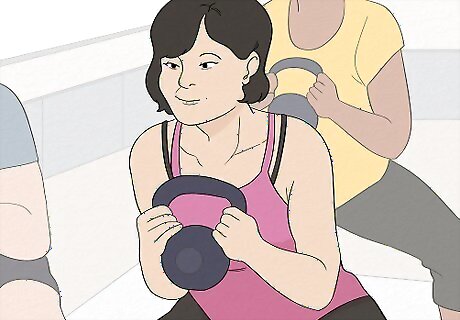
Exercise regularly. Staying physically active can make your body and mind feel better and can help promote a longer, healthier life. Staying active means you will be more able to keep doing things that make you happy. If you aren't physically active now, start small and work your way up. Start with easily achievable goals. Park farther away from the store and walk a little. Take the stairs instead of the elevator if you're only going up a couple of floors. Then, slowly start building more exercise into your routine. Stretching and yoga can help you stay flexible and maintain range of motion. This can help you maintain your ability to do other things you enjoy.

Eat a healthy diet. As you get older, eating the right foods becomes increasingly important in ensuring the good health you need to retain a satisfying quality of life. Pay close attention to what you eat. Specifically: Make sure you get enough protein to help keep your muscles strong. Limit fat intake, and eat healthy fats like those found in fish and avocado. Drink plenty of water. Eat lots of fresh fruits and vegetables. Consider dietary supplements. Talk to your doctor or a dietician about which one(s) might be most beneficial for you.

Don't smoke. Everyone knows cigarettes are bad for your health. They are bad for your skin and lungs and can cause cancer. Cigarettes have also been linked to faster mental decline in elderly people. If you already smoke, try to quit. Even if you have smoked for years, quitting may have a positive effect. If you don't smoke, don't start.
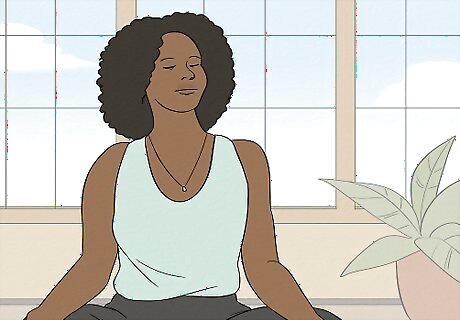
Try meditation. Daily meditation can help you deal with physical discomfort that might come with aging, and can also help with the anxiety and depression you might experience if you are struggling to accept aging. Try to clear your mind of all thoughts and focus on your breathing for several minutes. If thoughts begin to creep in, let them pass through your mind and return your focus to your breathing.

See a doctor regularly. To make sure your health stays good, see your doctor regularly. Catching problems early can help you deal with them before they become serious. Be your own advocate and ask good questions when you go see the doctor. Bring your health history, and be assertive about asking questions about any concerns you may have. If this stressful for you, remember that it's okay to bring a friend of loved one with you.




















Comments
0 comment